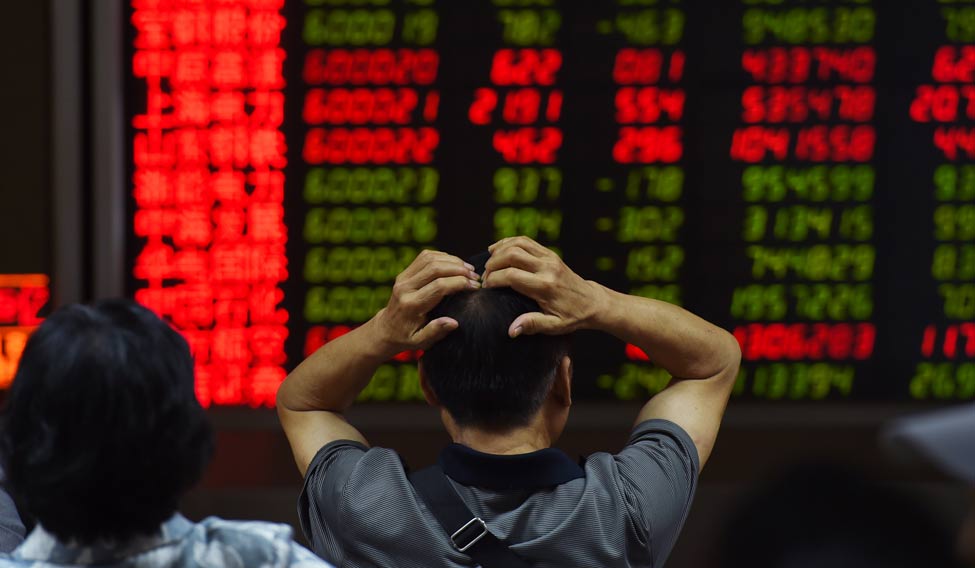The Bombay Stock Exchange's Sensex plunged more than 1,000 points in morning trades on Tuesday, after a 4 per cent crash in US markets sent investors in a sell-off mode worldwide.
The Sensex was down 1,052 points or 3.03 per cent at 33,704.93, while the wider NSE Nifty 50 tumbled 328 points or 3 per cent to 10,338.30 points. Overnight, the Dow Industrial Average in the US had slumped nearly 1,600 points, its biggest intra-day decline in history. It eventually closed 1,175 points or 4.6 per cent lower, while the Nasdaq also fell 3.8 per cent, sparking panic across Asian markets.
Japan's Nikkei had fallen 5.3 per cent, Hong Kong's Hang Seng was down 5 per cent and Korea's Kospi was also down over 3 per cent. Across the world, equity markets have largely been moving upwards towards new highs over 2017 and into January 2018, in the wake of a strong economy in the US and Europe. What has suddenly triggered a sell-off is the strong employment data in the US. The US Labour Department reported last Friday that wages had gone up 2.9 per cent in January, its fastest rise in nearly a decade.
While, it is actually a good news, it has also raised fears that wages there could rise faster this year, driving inflation higher and that could mean more interest rate hikes by the US Federal Reserve. This has driven bond yields higher. So far investors were only expecting 2-3 rate hikes by Fed this year.
Back home, the Budget proposal to levy a 10 per cent tax on long-term capital gains on equity, and a 10 per cent tax on dividend distributed by equity mutual funds has also dampened market mood. India's equity markets had also run-up sharply, the Sensex surging from 34,000 to 35,000 levels in just 16 trading sessions and to 36,000 levels in just five trading sessions. As of Monday's close, the Sensex had fallen 3.2 per cent since the Budget announcement on February 1.
However, analysts don't see this as a long-term bear market and expect a rebound soon as the corporate earnings recovery is on a strong footing and the Indian economy is also picking up.
"Our markets falling is pretty much related to the global sell-off. I don't see this as a start of a bear market, this is a sharp correction, which should start to turn around before the end of this week," Sudip Bandyopadhyay, chairman of Inditrade Capital told THE WEEK.
While analysts say some sell-off was overdue due to the sharp secular upward rally over the last few months, they are worried at the pace of the sudden decline in key indices.
"The current sell-off has been long overdue and not really unexpected. What is unexpected, is the speed and swiftness of the fall but then that's how bull market corrections are, sharp and swift," said Sageraj Bariya, vice president at East India Securities.
Of the 30-share Sensex, all the stocks were trading in the red. Tata Motors, was the biggest loser, down 6.7 per cent after its third quarter earnings missed street expectations. Banking stocks were among the other major losers, with Axis Bank, Yes Bank and State Bank of India all down 4 per cent, and ICICI Bank, Kotak Mahindra Bank and HDFC Bank also down over 3 per cent.
Mid-cap and small-caps took a heavier beating, with the BSE Mid-Cap index down 3.7 per cent and the BSE Small-Cap index falling 4.2 per cent.
Analysts like Bariya say there could be more correction ahead, but long-term investors should continue to invest.
"Our strong view is that this is a time to buy for an investor. We are definitely not saying that this is the bottom and further declines cannot be ruled out. Hence an investor should allocate long term capital in a staggered manner over next couple of weeks," added Bariya.
However, traders would be better-off sitting on the sidelines during this market mayhem, say analysts.






